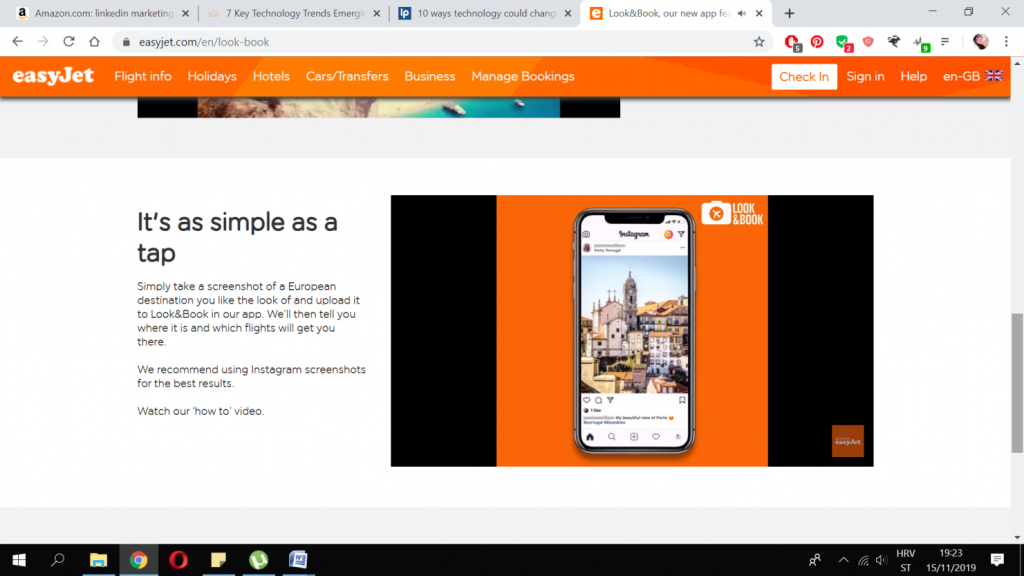During the last decade, we have witnessed a strong wave of technology progress and innovation. When it comes to tourism, you would be hard pressed to find an industry that was so drastically impacted by these changes.
What can we expect to see in 2020? Here are some of the key technology trends that will shape the way we travel:
1. Virtual Reality (VR)
What if the future of tourism implies no traveling whatsoever? If you had the chance to visit London, the Taj Mahal and Africa all from your living room couch, would you do it or wait for the real thing?
Implementing virtual reality definitely has a lot of applications and possibilities in the tourism industry. For all those curious wanderlusters who are too busy to take a vacation and fly to Madagascar, there is now an option to see it without actually going there!

Image source: pixabay.com
Real, physical traveling is, of course, here to stay. However, virtual reality tourism is definitely becoming more popular and we can expect to see exciting developments in 2020.
2. Internet of Things (IoT)
IoT is an exciting and innovative technological phenomenon that definitely has its place in the tourism industry. It’s already being used by some of the most innovative hotels around the world, and we can look forward to seeing much more.
Internet of Things implies mutual connectivity between devices through the Internet. For example, a guest will be able to control all devices in their hotel room from one device: from heaters and AC to lights and the TV.
Technology experts envision more applications of this exciting technology, which will allow for efficiency, convenience and organization on your travels.

Image source: pixabay.com
3. Using Online Writing Tools to Ace Property Descriptions
Descriptions of accommodation and vacation packages can be a great asset and a selling point when it comes to tourism marketing.

Image source: Hyatt.com
To get the most out of search engine traffic and organic visitors, make sure all of your texts are compliant with the most recent SEO practices (pay attention to Google’s new Bert algorithm!).
If you want to outsource your content writing, you can hire writing experts on TrustMyPaper, iWriter, Studicus or freelance websites such as Upwork or Freelancer.
To check your descriptions for SEO, grammar and spelling, you can use some of the following tools:
- Grammarly – helps you perfect your writing in terms of grammar, spelling and style
- ProWritingAid – a great alternative to Grammarly, allowing you to polish your content
- Small SEO Tools – allows you to check your descriptions for SEO with multiple tools, such as plagiarism checker, keyword density checker and word count tool
Next to writing services, you can also use the help of freelance experts to localize your tourism content to other languages.
4. Utilizing Social Media for Travel Recommendations and Bookings
Unsurprisingly, social media networks will have an increasingly important role in tourism industry marketing in the years to come.
As an example of this, EasyJet is currently offering their unique Look&Book service, where users can upload a screenshot of an inspiring travel photo from Instagram.

Image source: EasyJet.com
Then, the app finds the best routes and booking recommendations from your current location and allows you to book right then and there. Pretty amazing, right?
There are thousands of other useful apps for booking, traveling and sightseeing. In big cities, there are apps that show you available parking spots, queues in airports, etc.
5. Implementing Useful Tech Gadgets for Traveling
Today’s technology and innovation are moving at warp speed, and gadgets are no exception. During the last couple of years, we have seen great inventions in the fields of tourism and traveling that can dramatically change the way we travel.
If you take a look at the crowdfunding platform Kickstarter, you will see that it’s full of ideas for innovative travel gadgets, such as modular baggage, on-the-road laundry washing gadgets, packing accessories and more.

Image source: Kickstarter.com (MICRO Universal Adapter)
6. New accommodation options
If you ever had a horrible experience of sleeping at the airport, you now have sleeping pods on thousands of airports around the world.
Looking to take a tiny nap before you check in to your primary accommodation? Book a short-term hotel room or apartment for only a couple of hours.
These are just some of the examples of how accommodation is changing and keeping up with modern times. The ultimate goal is to accommodate to every single need a traveler may have.
“When I write hotel descriptions, I’m often surprised to find out about all the options for flexible and custom bookings. These are often not over-advertised, so visitors are mostly unaware of all the possible packages they can receive”, says Courtney White, a professional writer at PickTheWriter and IsAccurate.
7. Hospitality Robots
One of the biggest challenges of the tourism industry is to make advances in hospitality and services. After decades of superb service, it’s hard for high-end hotels to improve in this regard and offer something unforgettable and spoil their guests.
But, what if there’s a way of getting service faster and more efficiently, without overburdening the hotel staff? The answer is: robots.
Robots are being increasingly used across all industries, and there are some interesting implications for the tourism industry as well.
“Hotel chains such as Hilton are already using robotics and speech recognition technology as information service for their guests. However, there’s much more room for applying robotics in tourism. I’m excited to see what happens next!”, says Bernard Goldman, a travel blogger at Best Essay Education.
Conclusion
Technology has definitely entangled itself in every atom of the tourism industry. From the very first point of browsing for destinations to booking and vacationing, technology is an indispensable part of the traveler’s journey.
With a soaring number of new innovations and inventions, we can only expect this trend to increase exponentially.


